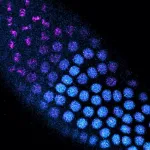INFORMATION:
Mystery canine illness identified
2021-04-14
(Press-News.org) An outbreak of vomiting among dogs has been traced back to a type of animal coronavirus by researchers.
Vets across the country began reporting cases of acute onset prolific vomiting in 2019/20.
The Small Animal Veterinary Surveillance Network (SAVSNet) at the University of Liverpool asked vets for help in collecting data, with 1,258 case questionnaires from vets and owners plus 95 clinical samples from 71 animals.
Based on this data, a team from the universities of Liverpool, Lancaster, Manchester and Bristol identified the outbreak as most likely to be a variant of canine enteric coronavirus (CeCoV).
Canine coronavirus only affects dogs and is not the same as Sars Cov2 which causes Covid in humans. Researchers found no evidence of any similar illness in people.
The work is published in Emerging Infectious Diseases.
The team are working on a project funded by the Dogs Trust called SAVSNet-Agile which aims to develop a national surveillance system for canine health.
Dr Barry Rowlingson from Lancaster University said: "We've developed complex statistical models to look for disease outbreaks. Being able to rapidly detect increased incidence, without triggering a false alarm from a natural random variation, is the key problem here. Early detection is crucial to early treatment and enhanced monitoring.
"The SAVSNet Agile project aims to feed information back to local veterinary practices so they can be alert to any new outbreaks."
Vets began to suspect an infectious cause because vomiting was more frequent than is typical for canine gastroenteritis.
SAVSNet researchers found a specific and significant increase in the number of dogs recorded as exhibiting gastroenteric signs between late December 2019 and March 2020.
As well as reusing health records, SAVSNet also collected questionnaire data from vets and owners caring for affected animals, as well as healthy controls. This showed male dogs were more at risk than females.
Charlotte Appleton, SAVSNet Agile PhD Student, said: "Obtaining such important results at an early stage of my PhD is a wonderful achievement and will hopefully provide a pathway of higher visibility into the health of domestic animals."
ELSE PRESS RELEASES FROM THIS DATE:
Study: Ag policy in India needs to account for domestic workload
2021-04-14
ITHACA, N.Y. - Women's increased agricultural labor during harvest season, in addition to domestic house care, often comes at the cost of their health, according to new research from the Tata-Cornell Institute for Agriculture and Nutrition (TCI).
Programs aimed at improving nutritional outcomes in rural India should account for the tradeoffs that women experience when their agricultural work increases, according to the study, "Seasonal time trade-offs and nutrition outcomes for women in agriculture: Evidence from rural India," which published in the journal Food Policy on March ...
The chillest ape: How humans evolved a super-high cooling capacity
2021-04-14
PHILADELPHIA-- Humans have a uniquely high density of sweat glands embedded in their skin--10 times the density of chimpanzees and macaques. Now, researchers at Penn Medicine have discovered how this distinctive, hyper-cooling trait evolved in the human genome. In a study published today in the Proceedings of the National Academy of Sciences of the USA, researchers showed that the higher density of sweat glands in humans is due, to a great extent, to accumulated changes in a regulatory region of DNA--called an enhancer region--that drives the expression of a sweat gland-building gene, explaining why humans are the sweatiest ...
TGen identifies gene that could help prevent or delay onset of Alzheimer's disease
2021-04-14
PHOENIX, Ariz. -- April 13, 2021 -- Findings of a study by the Translational Genomics Research Institute (TGen), an affiliate of City of Hope, suggest that increasing expression of a gene known as ABCC1 could not only reduce the deposition of a hard plaque in the brain that leads to Alzheimer's disease, but might also prevent or delay this memory-robbing disease from developing.
ABCC1, also known as MRP1, has previously been shown in laboratory models to remove a plaque-forming protein known as amyloid beta (Abeta) from specialized endothelial cells that surround and protect ...
Most differences in DNA binding compounds found at birth in children conceived by IVF not seen in early childhood, NIH study finds
2021-04-14
Compared to newborns conceived traditionally, newborns conceived through in vitro fertilization (IVF) are more likely to have certain chemical modifications to their DNA, according to a study by researchers at the National Institutes of Health. The changes involve DNA methylation--the binding of compounds known as methyl groups to DNA--which can alter gene activity. Only one of the modifications was seen by the time the children were 9 years old.
The study was conducted by Edwina Yeung, Ph.D., and colleagues in NIH's Eunice Kennedy Shriver National Institute of Child Health and Human ...
UBCO research shows a mother's fat intake can impact infant infectious disease outcomes
2021-04-14
A team of UBC Okanagan researchers has determined that the type of fats a mother consumes while breastfeeding can have long-term implications on her infant's gut health.
Dr. Deanna Gibson, a biochemistry researcher, along with Dr. Sanjoy Ghosh, who studies the biochemical aspects of dietary fats, teamed up with chemistry and molecular biology researcher Dr. Wesley Zandberg. The team, who conducts research in the Irving K. Barber Faculty of Science, explored the role of feeding dietary fat to gestating rodents to determine the generational effects of fat exposure on their offspring.
"The goal was to investigate how maternal dietary habits can impact an offspring's gut microbial communities and their associated sugar molecule patterns ...
Lab study solves textbook problem: How cells know their size
2021-04-14
HANOVER, N.H. - April 14, 2021 - Scientists have searched for years to understand how cells measure their size. Cell size is critical. It's what regulates cell division in a growing organism. When the microscopic structures double in size, they divide. One cell turns into two. Two cells turn into four. The process repeats until an organism has enough cells. And then it stops. Or at least it is supposed to.
The complete chain of events that causes cell division to stop at the right time is what has confounded scientists. Beyond being a textbook problem, the question relates to serious medical challenges: ...
Lundquist investigator Chang's study in JAMA Internal Medicine
2021-04-14
LOS ANGELES (April 13, 2021) -- The Lundquist Institute (TLI) Investigator Dong W. Chang, MD, and his colleagues' study on critically ill patients and ICU treatments was published in JAMA Internal Medicine. The study - "Evaluation of Time-Limited Trials Among Critically Ill Patients with Advanced Medical Illnesses and Reduction of Nonbeneficial ICU Treatments" - found that training physicians to communicate with family members of critically ill patients using a structured approach, which promotes shared decision-making, improved the quality of family meetings. This intervention was associated with reductions in invasive ICU treatments that prolonged suffering without benefit for patients and their families.
"Invasive ICU treatments are frequently delivered to patients ...
Telescopes unite in unprecedented observations of famous black hole
2021-04-14
In April 2019, scientists released the first image of a black hole in galaxy M87 using the Event Horizon Telescope (EHT). However, that remarkable achievement was just the beginning of the science story to be told.
Data from 19 observatories released today promise to give unparalleled insight into this black hole and the system it powers, and to improve tests of Einstein's General Theory of Relativity.
"We knew that the first direct image of a black hole would be groundbreaking," says Kazuhiro Hada of the National Astronomical Observatory of Japan, a co-author of a new study published in The Astrophysical Journal Letters that ...
Climate change is making Indian monsoon seasons more chaotic
2021-04-14
If global warming continues unchecked, summer monsoon rainfall in India will become stronger and more erratic. This is the central finding of an analysis by a team of German researchers that compared more than 30 state-of-the-art climate models from all around the world. The study predicts more extremely wet years in the future - with potentially grave consequences for more than one billion people's well-being, economy, food systems and agriculture.
"We have found robust evidence for an exponential dependence: For every degree Celsius of warming, monsoon rainfalls will likely increase by about 5%," says lead author Anja Katzenberger from the Potsdam-Institute ...
Ancient pottery reveals the first evidence for honey hunting in prehistoric West Africa
2021-04-14
A team of scientists, led by the University of Bristol, with colleagues from Goethe University, Frankfurt, has found the first evidence for ancient honey hunting, locked inside pottery fragments from prehistoric West Africa, dating back some 3,500 years ago.
Honeybees are an iconic species, being the world's most important pollinator of food crops. Honeybee hive products, including beeswax, honey and pollen, used both for food and medicinal purposes, support livelihoods and provide sources of income for local communities across much of Africa, through both beekeeping ...




